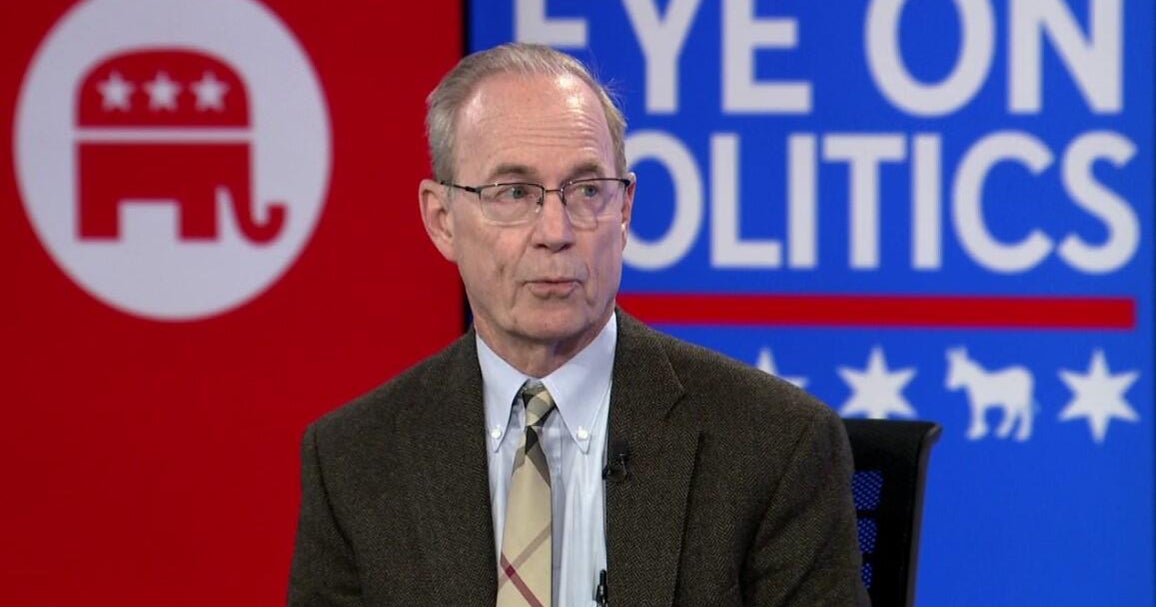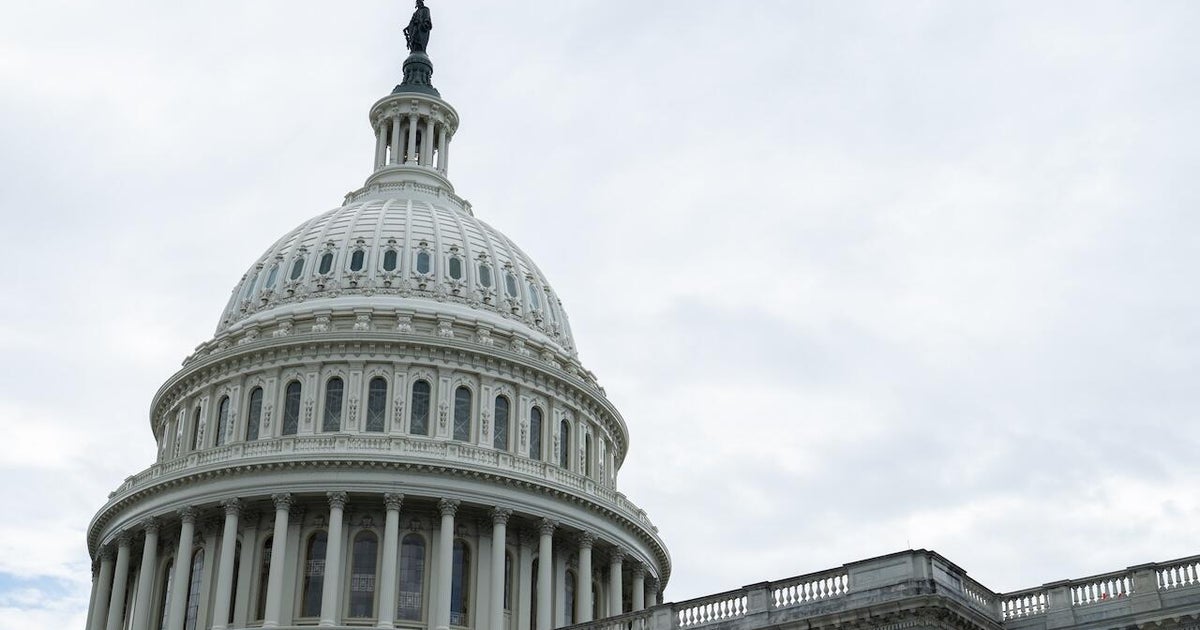Republicans are leaving the House at a record pace. Why?
So far this year, 22 Republicans in the U.S. House have announced that they will not run for reelection next November. This represents the most retirements for either party in a non-election year this decade, according to an analysis by CBS News.
By comparison, six House Democrats have announced their retirements this year.
From potentially competitive 2020 reelections, to a growing dread of life in the minority, here are some of the factors that play into this year's Republican exodus.
Redistricting
After a year of court battles over partisan gerrymandering, a panel of North Carolina judges have approved a new set of congressional maps that are much less Republican-friendly.
Three House Republicans from North Carolina have since announced their retirements: George Holding, Mark Walker and Trump ally Mark Meadows.
Meadows' seat is likely to remain in Republican hands. Holding and Walker, however, both received new districts that included Democratic strongholds like Raleigh, or counties that Hillary Clinton carried like Guilford and Forsyth.
"I should add, candidly, that, yes, the newly redrawn congressional districts were part of the reason I have decided not to seek reelection," Holding said in his retirement statement.
Other Republican retirees in usually red suburban seats had their own wake-up call in 2018.
Texas Representative Pete Olson won his Houston-Fort Bend area district by 7 points in 2008. Every election since, he's won by nearly 20 points. That is until 2018, when he won by less than five points against Democrat Sri Preston Kulkarni.
Of the six Texas GOP members that aren't running in 2020, three of them won by 5 points or less in 2018: Olson, Will Hurd, and Kenny Marchant. Democratic groups were quick to call the pattern a "Texodus" and are looking to pick up these three open seats that were competitive in 2018.
"We're doing a heckuva lot more offense than we were expecting to do," said Robby Mook, president of the House Majority PAC, a group dedicated to helping House Democrats keep their control. "We just have opportunities on the table that I don't think anybody anticipated."
Mook said the retirement of Peter King, a Republican congressman from New York's Long Island suburbs, has created another potential pickup for Democrats.
"King is a perfect example of someone who was pretty comfortable in his seat, but now that he's gone, that is a battleground seat," Mook said.
Former Congressman Tom Davis, a Virginia Republican who retired in 2008, said an increase in partisanship has made life harder for swing-district representatives.
"I sat in a Democratic district, but I never had a really rough race. Nowadays they spend four or $5 million just polarizing things," said Davis, who retired in 2008. "If you're in a swing seat, you're going to be challenged."
Life in the minority
Since President Trump took control of the Republican Party, 106 House Republicans have either been defeated in elections or retired. This year's casualty list includes members who have criticized the president before, including Hurd.
"There's no such thing as voting with him when you agree with him and voting against him when you don't. You get primaried," Mook said. "The Republican Party's gone so all in with [Mr. Trump] that there's no there's no such thing as halfway anymore."
This presents a problem for Republicans who represent GOP-leaning suburban seats where Mr. Trump is unpopular.
"[Mr. Trump is] redefining the electoral landscape and I don't think Republicans can do much to change that," Davis said.
But to Ron Bonjean, a former spokesperson for House and Senate Republican Leaders, this year's retirements say more about life in the minority for House Republicans than about Mr. Trump.
"[It] has nothing to do with President Trump. It has every indication of being a very partisan atmosphere where little can get done," he said. "Being in the minority isn't any fun when you've been a majority and you know what it's like to drive the car. And now you're in the passenger seat, you can't make any decisions about where it's going."
Before the 116th Congress, Representative Bill Flores of Texas has only known life in the majority. He began his career in 2012, right after Democrat Nancy Pelosi ended her first stint as House Speaker.
Now Flores has had to deal with life in the minority.
"You don't control the legislative flow at all," he said. "You just have to be a little bit more agile on your feet than you are in the majority, to be able to put building blocks into what hopefully will become bipartisan legislation down the road."
Flores announced in September he would forego reelection in 2020.
Term limits
Term limits, either self-imposed or due to House GOP rules, has also been a pattern amongst retirees. Ted Yoho of Florida said his retirement makes good on a promise to only serve four terms. Both Rob Bishop of Utah and Mike Conaway of Texas reached the limit of three terms in committee leadership when they decided to retire.
In response, House Republicans, as well as President Trump, floated the idea of easing the definitions of term limits to only count chairmanship titles, and not the ranking member status minority lawmakers get.
"House Republicans should allow Chairs of Committees to remain for longer than 6 years," Trump tweeted. "It forces great people, and real leaders, to leave after serving. The Dems have unlimited terms. While that has its own problems, it is a better way to go. Fewer people, in the end, will leave!"
Looking ahead to 2020
The NRCC and outside Republican groups are banking on impeachment to cause vulnerable Democrats in Trump-won districts to lose their seats. To them, their path runs straight through those 31 districts, including newly-minted Republican Jeff Van Drew's New Jersey seat.
Republicans need to flip 19 seats red to gain back the majority, but also have to defend all 197 of their currently-held seats, including in all the districts with retiring members.
"I don't think there's confidence that they can win back the House anytime soon, and for good reason," Mook said.
"It's precisely because of open seats that I think they're really in a jam, because those open seats are giving Democrats a chance to help offset any losses. It's a vicious cycle," Mook added.
The Democratic Congressional Campaign Committee had already targeted Hurd's, Marchant's and Olson's Texas districts before their retirement announcements. Rob Woodall of Georgia's 7th district is also retiring, and he had one of the tightest 2018 victory margins, winning by just 0.2%.
Flores and Bonjean point to the earlier filing deadlines as a reason for the earlier retirement announcements, in an effort to give enough time to recruit viable candidates.
"You eventually get new blood in the system through recruitments," Bonjean said. "So the key here is for Republicans to recruit candidates in these districts wherever of retirement to make sure that we have good people going back to Capitol Hill."
A total of 12 candidates, including former Texas representative and former National Republican Congressional Committee chairman Pete Sessions, are running in Flores' 17th district. Immediately after deciding he'd retire, Flores held "candidate workshops" to recruit candidates ahead of the December primary filing deadline.
Davis, who voted to impeach President Bill Clinton in 1998, said vulnerable House Democrats will have to wait and see how this month's impeachment vote plays out in their districts next November.
"I think as you find out from Van Drew, you're more at risk if your buck your party, but these are no win votes for these members no matter what they did," he said.
In the end, Davis believes the dynamics of the 2020 presidential race could determine how the 2020 House races turn out.
"We're in a cycle now where you have less ticket splitting than anytime in history. So [Republicans] are going to rise or fall with how the president does," he said.
"But we don't know, things can change very rapidly, and if the Democrats nominate a [Bernie] Sanders, it can all turn around pretty quickly."




